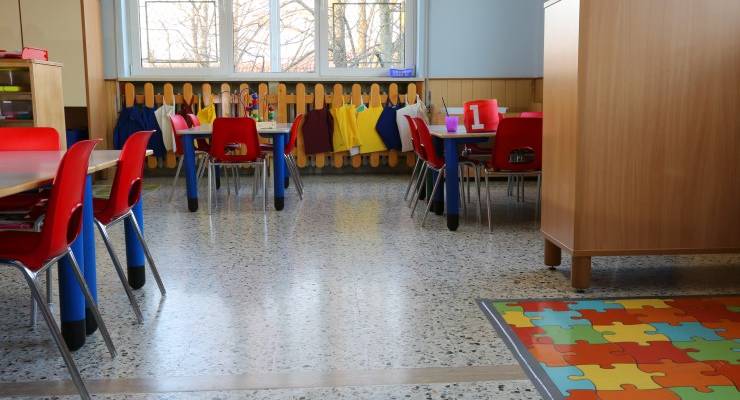
When Prime Minister Scott Morrison introduced free childcare in April he acknowledged it was a “vital” service for families during an “unsettling time”.
Accessing and paying for childcare during the pandemic has not disappeared for parents despite the government’s inexplicable decision to withdraw free childcare and end support payments for childcare workers — this while case numbers were not dwindling nor plateauing but rapidly rising.
It is still an “unsettling time” for most families. The conditions that necessitated these support measures have fundamentally shifted — many parents still need childcare and Victoria announced last week centres would be closed for everyone but children of “permitted” workers.
Former prime minister Julia Gillard wrote last week about the potential impact globally on the world’s children as 1.5 billion young learners (90% of the world’s schoolchildren) have been locked out of school during the pandemic.
But the disruption could start earlier as many families won’t access childcare in the coming months, either because they aren’t able to in Victoria or because they can no longer afford to.
The lack of support for out-of-work or underemployed parents assumes if you’ve got a job you can pay for childcare and if you don’t have a job you can look after your kids.
But equating time at home with time at childcare overlooks the social and developmental benefits in early childhood education, director of Australian programs at UNICEF Australia Nicole Breeze said.
“High quality early education provides a vital role in stimulation and we view it as complementary to the important role that caregivers play,” Breeze says. “It is a false dichotomy to suggest we need one or the other when in fact we need both.”
While the child should be paramount in this discussion, Breeze referred to a 2019 study by the Front Project and PwC that calculated the participation of children in quality early learning delivers a return on investment of 2:1 to the economy.
“What we saw through phase one of the emergency measures was a boost on [childcare] participation among children who hadn’t previously been able to participate,” she says. “We want to remove some of the barriers to access for children from disadvantaged families.”
The government’s literature review found that childcare in the first three years of life benefited children from disadvantaged backgrounds the most. (It had little overall impact on cognitive and language development for all kids.)
For three- to five-year-olds longitudinal studies have demonstrated the effectiveness of high-quality, focused preschool programs in “reducing the effects of social disadvantage, developing children’s social competency and emotional health, and preparing children for a successful transition to school”.
Families are already worried. Dr Sandra Hesterman is the director of early childhood education at Murdoch University and has been surveying parents about the challenges and opportunities in having kids at home. She said the preliminary data from the first 500 responses showed a number of anxieties.
“They [feel] that childcare is an important venue for the purposes of social interaction not just for the children but for them,” Hesterman says.
“They feel they are limited in what they can offer their kids in terms of stimulation because they don’t necessarily have access to a variety of resources and activities … and there is a lack of confidence in their own ability to support learning.”
They were stressed about not having the support of grandparents and extended family, scared they hadn’t created an “appropriate learning environment” and worried about their kids getting “bored”.
Professor Nicola Yelland from the Melbourne graduate school of education at the University of Melbourne said the communal aspect of childcare underpinned all future learning.
“The dismissal of early childhood education as babysitting is insulting and demeaning,” she says.
But she wants parents to remember they can be an important part of their child’s education even while access to childcare is difficult.
“It is hard to juggle a job and kids at home but learning is continuous and it happens outside of childcare centres and parents need to be supported in that,” she says.








So much evidence that free childcare pays itself back easily from an economic perspective, yet ‘the best economic managers’ do the exact opposite, one might wonder what the reason is.
Childcare – aka mothers working madly to pay other women to look after their kids so that they can work to afford the costs of childcare – rinse & repeat.
Never mind that every study has shown that children benefit – little things like better cognitive, language, and social development, better school readiness (e.g. reading, writing, number skills) from focused care from known, related… wot’s the word… persons, aka family care.
“Children in full-time day care were close to three times more likely to show behavior problems than those cared for by their mothers at home” – hooda thunk.
Is this not the current situation/crisis ideal to reconsider early child care & development?
Failing extended families (not necessarily consanguineous), anyone remember playgroups?
Nothing beats the nurture of a family, except for the mortgage, then both parents have to work. The gravy train rolls on for a few and the rest of us are on the merry-go-round peddling fast.
If a mortgage is more important that the welfare of the resident children it suggests warped values.
Oh well, that’s alright “PwC that calculated the participation of children in quality early learning delivers a return on investment of 2:1 to the economy” – I’m so totally convinced, whatever the economy needs is just tickety-boo.
Never mind that Professor Nicola Yelland “… wants parents to remember they can be an important part of their child’s education…” – knock me down with a feather!
… “wants parents to remember they can be an important part of their child’s education…” – knock me down with a feather!”
Oh really? Agreed Agni, we turned our back on traditional methods of child education and bringing up children into the domain of both parents working while the “state” molests our children behind our backs. Sow the wind, reap the whirlwind.
What happens to vested interests or conflicts of interest when it comes to childcare? Why do journalists believe people in the industry? The plain fact is that early childcare ONLY provides a benefit to children from deprived backgrounds. My understanding is the ‘evidence’ supporting the view of early warehousing of children being beneficial for the children is from research in the USA on children mostly from the working poor single mother (ie. they don’t have a decent social security system or decent minimum wages) families. In these circumstances childcare is better than home. But it’s disingenuous to the extreme to translate that to Australia and to the middle class. With that flaw underpinning it, the whole article is just rubbish.
Don’t get me wrong, all my children attended childcare before their school years. But would they have been better off with one of their parents instead, if we could afford it? Definitely!
The reality is that childcare provides a twin benefit to economic fundamentalists. Firstly, it transfers an economic activity that is not counted in GDP calculations (unpaid childcare at home by the mother) to that which is counted (childcare in the market economy). Secondly, it enables women’s increased participation in the ‘paid’ workforce (counted as ‘growth’ in GDP and claimed by Morrison and Labor as a benefit) but ignores her unpaid work and, if any, loss of leisure time. In essence it’s mining women’s’ capacity to do more work and counting that as a free good without cost. Other than the atrocious pay rates for ‘care work’ which includes childcare, the whole industry perspective is as misogynist as it comes.